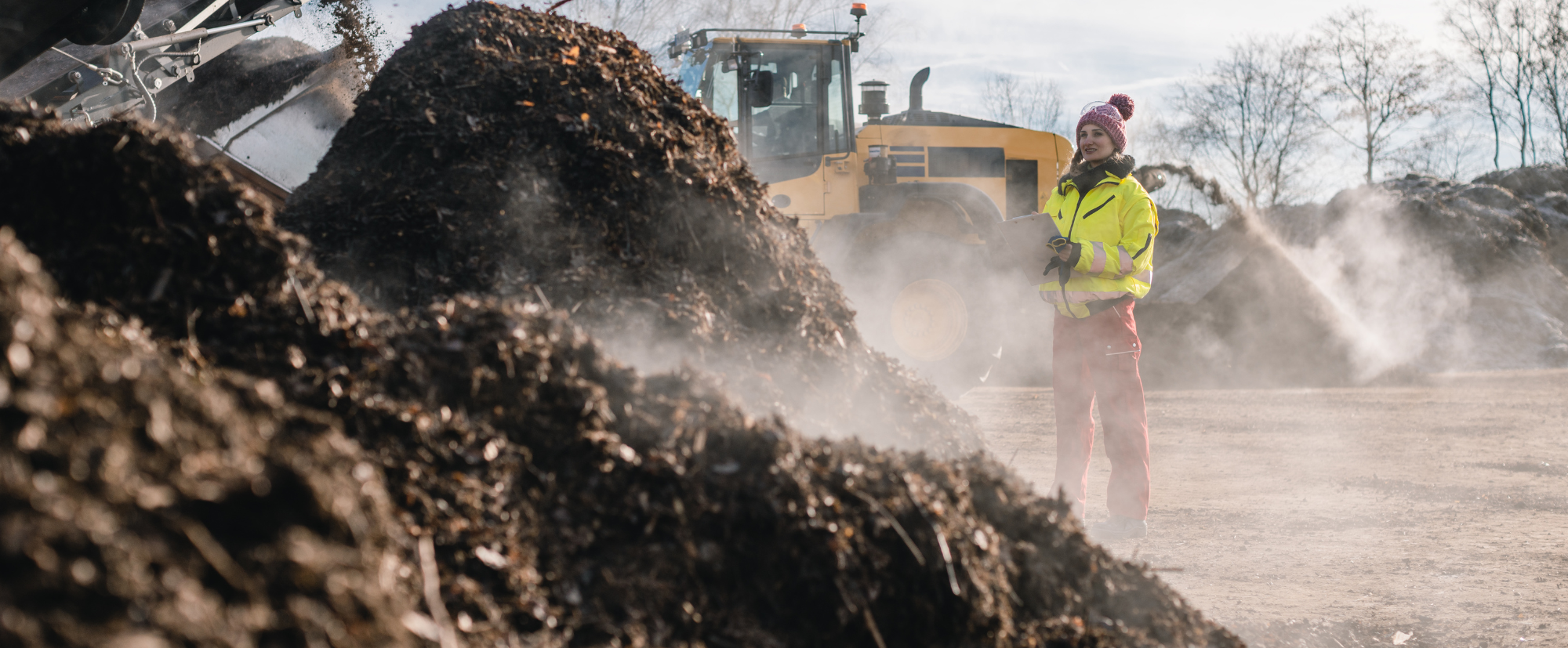What Does Commercially Compostable Mean? Insights & Impacts
Not sure what does commercially compostable mean? Well, there are certain products that you may have come across with a tag labeled as commercially compostable. This tag has a meaning behind it and here in this article, you will get to know all about commercially compostable products and what does it mean.
A commercially compostable product can only be composted at an industrial or commercial composting facility. Unlike home composting where you can do it either in your community garden or your home, these products need specialized biological treatments in order to break them down completely. This normally involves specific controlled conditions, specific temperature ranges and some specialized equipment which are mainly available only in commercial composting factories. Waste recycling like this is done on a larger scale.
Industrial or commercial composting is also conducted on a much larger scale than the ones done at home. The waste piles need to be properly monitored and managed in order to decompose them whereas the ones used to compost at home usually do little monitoring.
How Does Commercial Composting Work?
Now that you have understood what commercially compostable means it is time to know more about how commercial composting works. If commercial composting is available in your areas, then you might see that collection bins are distributed across businesses and homes to gather these organic wastes. The bin is then collected together and the waste products are added to a large pile of compost at the composting facility. Once it is all collected, the waste then undergoes one of the following three processes:
1. In-vessel:
Waste that is collected is placed into a controlled vessel and is then physically turned.
2. Aerated Static Pile:
Piles of waste are layered with wood chips or branches and there is passage of air allowed through it with various networks of pipes.
3. Windrows:
There are long rows of waste that are aerated by mechanical turning.
There are however multiple requirements that need to be set to select these waste before letting them undergo the process and these requirements can be provided as follows:
- Should be free of any harmful substances
- Should pass testing and certification processes
- Meet a certain decomposition and biodegradability rate
- Be compatible with various industrial composting facilities which are available.
Criteria for Commercially Compostable Products
Apart from knowing what commercially compostable means it is also important to know more about certain criteria that need to be followed. Most commercially compostable products have to follow certain criteria and certifications to be labeled as compostable products. These standards can be provided as follows:
1. ASTM-D6400 Standard:
The ASTM-D6400 standard indicates the breakdown of commercially compostable products should be done within 180 days and that the final product after waste recycling should yield organic compounds. The products should not consist of any toxic qualities. The products need to meet the standards which are mentioned by the American Society for Testing and Materials also called ASTM in order to be labeled as commercially compostable or industrially compostable.
2. EN 13432 Standard:
The EN 13432 is a European version of the US ASTM Standard which sets the criteria for industrially compostable products. According to the EN 13432 standard, the product should disintegrate within 12 weeks and must undergo complete biodegradation within 6 months.
It is essential to check for commercially compostable products with the above-mentioned certification as there are very few commercial composting facilities as compared to recycling plants and landfills. Hence it is crucial that a community focuses on how to properly dispose of industrially compostable products.
Commercial Compost vs Home Compost
Most of the compostable products need to follow certain conditions to properly decompose and complete the cycle. For this reason, it is important to identify the difference between commercial compost vs home compost. Here are a few differences between the two:
- Home compost is a great way to handle organic waste products present in your home. These products are usually in small volumes.
- Most home compost products include leaves, tea bags, grass clipping, and food scraps.
- Home compost helps you produce great fertilizers for your soil.
- Home compost conditions however are not great for breaking down larger pieces of compost or for larger volumes of organic wastes.
- When you compare commercial compost vs home compost, the conditions required for home compost include a balance of carbohydrate-rich materials and nitrogen-rich materials.
- On the other hand, for commercial composting, you require big facilities to break down the compostable materials along with controlled conditions.
- The oxygen levels, temperature, and humidity levels along with the levels of carbon and nitrogen-rich materials should be balanced properly throughout the breakdown process in waste recycling.
- Ensuring the conditions in the commercial composting process is important to ensure that it is conducted quickly and efficiently.
Benefits of Commercial Composting
Commercially compostable products have their own set of benefits that tend to go beyond environmental impact and proper waste management. Commercially compostable products tend to contribute to creating a more sustainable future by reducing pollution, supporting the growth of a circular economy, and promoting resource efficiency. Here are some of the other benefits of commercial composting that help conserve nature:
Reduced Landfill Waste
As commercially compostable waste products can be easily broken down and turned into composed they are great to reduce landfills. This in turn will also reduce the amount of waste that needs to be disposed of in these commercial compost facilities.
Lower Carbon Footprint
Composting waste products results in a lower amount of greenhouse gases being released as compared to the other wastes in landfills. Hence by making use of commercially compostable products, we can contribute to a reduction in carbon footprint while also taking a small step towards climate change.
Nutrient-Rich Compost
The compost generated from commercially compostable or industrial composting products is considered to be valuable materials as they have immense use as fertilizers in agriculture. It also enriches the soil by making it nutrient-rich. Compost also improves the structure of soil while also enhancing its ability to retain water levels. This in turn will also improve the health of plants grown.
Support for Circular Economy & Sustainable Practices
Commercially compostable products are a part of the circular economy where the materials are designed such that they can be both reused and recycled. By using these products we ensure sustainable practices by reducing waste and conserving resources. In such a way, the entire cycle of sustainability proceeds smoothly.
Challenges & Limitations of Commercial Composting
While the entire concept of commercial composting or industrial composting definitely sounds great in theory, it also consists of multiple limitations and challenges. It is hence important to address all of these issues and challenges to promote the adoption of commercially compostable products and hence to support better waste management practices. Some of the issues and limitations can be provided as follows:
Lack of Infrastructure
One of the main challenges is the limited availability of facilities that can contribute to commercial composting. These facilities need to be large enough to handle huge quantities of organic waste. This lack of infrastructure makes it hard for facilities to complete their cycle of compostable products.
Contamination Issues and Proper Sorting
Commercial composting highly relies on the proper sorting of compostable materials to ensure that there is no contamination done by non-compostable materials. However, this can be quite challenging to correctly identify compostable products from other waste materials.
Consumer Awareness
A lot of consumers are not really aware of the difference between non-compostable and compostable products. This lack of knowledge can lead to contamination of composting facilities with non-compostable items. This can affect the success of composting the waste.
Cost Considerations
Commercial composting is quite expensive than other methods such as incineration or landfilling. The costs of collection, processing, and transportation can be way too high especially since there are limited facilities that help in the composting process.
Conclusion:
Understanding what commercially compostable means and all about home compostable products can help you lend a hand to sustainable waste management practices. By choosing compostable products you can also reduce any environmental impacts, while also supporting and contributing to a sustainable environment.
It is also important for policymakers, businesses, and individuals to work together and make a more compost-friendly environment to protect our planet and conserve it for future generations.
FAQ’s
1. Is commercially compostable better than plastic?
While commercially compostable products are definitely better for the environment than the traditional plastic which is used. However proper handling of the compostable products is also important.
2. Can I compost commercially compostable at home?
Usually, industrial compostable facilities host a number of special equipment that help in breaking down compostable products. Normally these materials are not readily available at home and hence commercially compostable products cannot undergo the composting process at home.
3. Will commercially compostable items break down in landfills?
If the compostable products are put in a landfill where there is enough oxygen available, then there are chances that they will break down at a similar rate to the other biodegradable materials present.
4. Is it better to buy compostable or recyclable?
When looking to buy products for a better environment it is recommended to go with compostable, recyclable, and then biodegradable. This is because compostable products if disposed of properly can ensure more resources to be produced.




